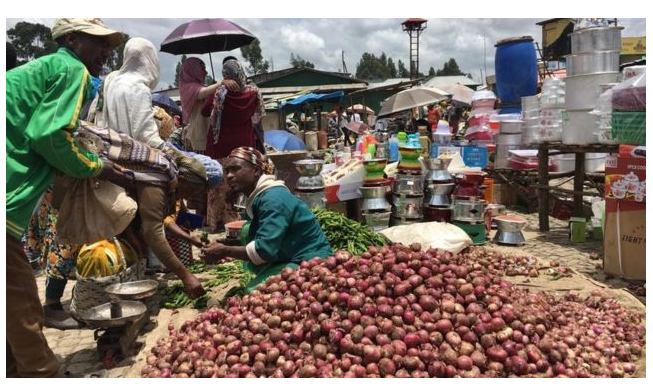Russia-Ukraine War Causing Inflationary Pressure on Basic Food Items - ENA English
Russia-Ukraine War Causing Inflationary Pressure on Basic Food Items

BY SOLOMON DIBABA
The issue of food is certainly not an independent variable. Some even try to predict that the production, distribution and availability of food on the market will be the future determinants of international socio-political and economic challenges.
According to UNFAO report issued March , 2022, the overall rise last month was driven by an 8.5 per cent increase in the FAO Vegetable Oils Price Index, a new record high.
This was mostly due to sustained global import demand, which coincided with a few supply-side factors, such as lower soybean production prospects in South America.
The Dairy Price Index averaged 6.4 per cent higher in February than January was supported by lower-than-expected milk supplies in Western Europe and Oceania, as well as persistent import demand, especially from North Asia and the Middle East.
Last month, the Cereal Price Index increased 3.0 per cent over January. Contributing factors included rising quotations for maize and other coarse grains, caused by continued concerns over crop conditions in South America, uncertainty about maize exports from Ukraine, and rising wheat export prices.
Strong global import demand contributed to 1.1 per cent rise in the Meat Price Index. Other factors included tight supplies of slaughter-ready cattle in Brazil and a high demand for herd rebuilding in Australia.
The FAO Sugar Price Index declined by nearly two per cent amid favourable production prospects in India, Thailand and other major exporters, as well as improved growing conditions in Brazil.
The report of Reuter started from March 6, 2022 shows that the war between Russia and Ukraine, one of the world's breadbasket nations, has driven wheat prices to 14-year highs, forcing bread consumers to eat the cost. Reuters added that the war has severely hampered trade from Black Sea ports, driving up global Chicago benchmark wheat prices by 40% and further pushing global food inflation that was already the highest in a decade.
Supply disruptions from Russia and Ukraine, which together account for 30% of world wheat exports and 20% of corn exports, will erode food security for millions of people, with the Middle East and North Africa especially vulnerable due to their reliance on imports, said Julie Marshall, spokesperson for the World Food Program.
Oil and gas prices have also showed spike due to sanctions against Russia, while costs of freight and raw materials like steel were already soaring due to pandemic-related supply chain breakdowns.
Consumers of two of the world's biggest wheat-growing nations, Canada and the United States, are paying the price.
Supplies in the European Union, Russia, the United States, Canada, Ukraine, Argentina, Australia and Kazakhstan are set to fall to a nine-year low by 57 million tons by the end of the 2021/22 season, as International Grains Council (IGC) data shows.
The advent of COVID-19, drought induced food shortage in various zones in Somali Region and Borena Zone in Oromia, the unprecedented escalation of the number of IDPs, resulting from enormous damages and lootings by the invasion of terrorist TPLF in Amhara and Afar as well as the war that broke out between Russia and Ukraine, among others, are the major driving forces for price hikes of food items and oil.
According to UNICEF (2022) Climate change and its resulting effect of enormous land degradation and significant depletion of pasture in Borena Zone is pushing pastoralist communities to the brink. Erratic rains coupled with failed rains forced many to move far from the usual migration routes. Livestock deaths are reported in many woredas (districts) of the zone. The drought also exacerbated the already scarce water availability in the area. Children are missing out from their education while rates of malnutrition in pregnant and breastfeeding women and children under the age of five are also increasing.
In Somali region, prolonged drought could be attributed to below-average rainfall during this year’s rainy season, which in turn damaged grazing lands and caused a shortage of water for people and fodder and water for livestock. People in the region lack access to safe drinking water, and are unable to meet their basic needs and livelihoods due to loss of livestock.
The war waged by terrorist TPLF in Amhara and Afar regions have now resulted in the displacement of more than 2 million of people which had been producing their own food prior to the invasion. Making matters worse, citizens who were seriously affected by the terrorist TPLF’s deliberate emergency food blockage to Tigray, forcing Tigrayans fleeing to Amhara and Afar regions in desperate need for food and safety.
The recent unprecedented skyrocketing of price of edible oil is indeed a matter of concern that the government is trying to address. The Ministry of Finance recently reported that the government has purchased about 5 million quintals of wheat as well as 12.5 million liters of cooking oil,
The purchase was made in the past two months as authorities move to stabilize the increased food inflation in the country. Increasing price of edible oil would be the challenge the country could face over the coming month. Apart from possible shortage, it would certainly increase the rate of inflation not only on food and oil prices but on the entire economic and social service sectors.